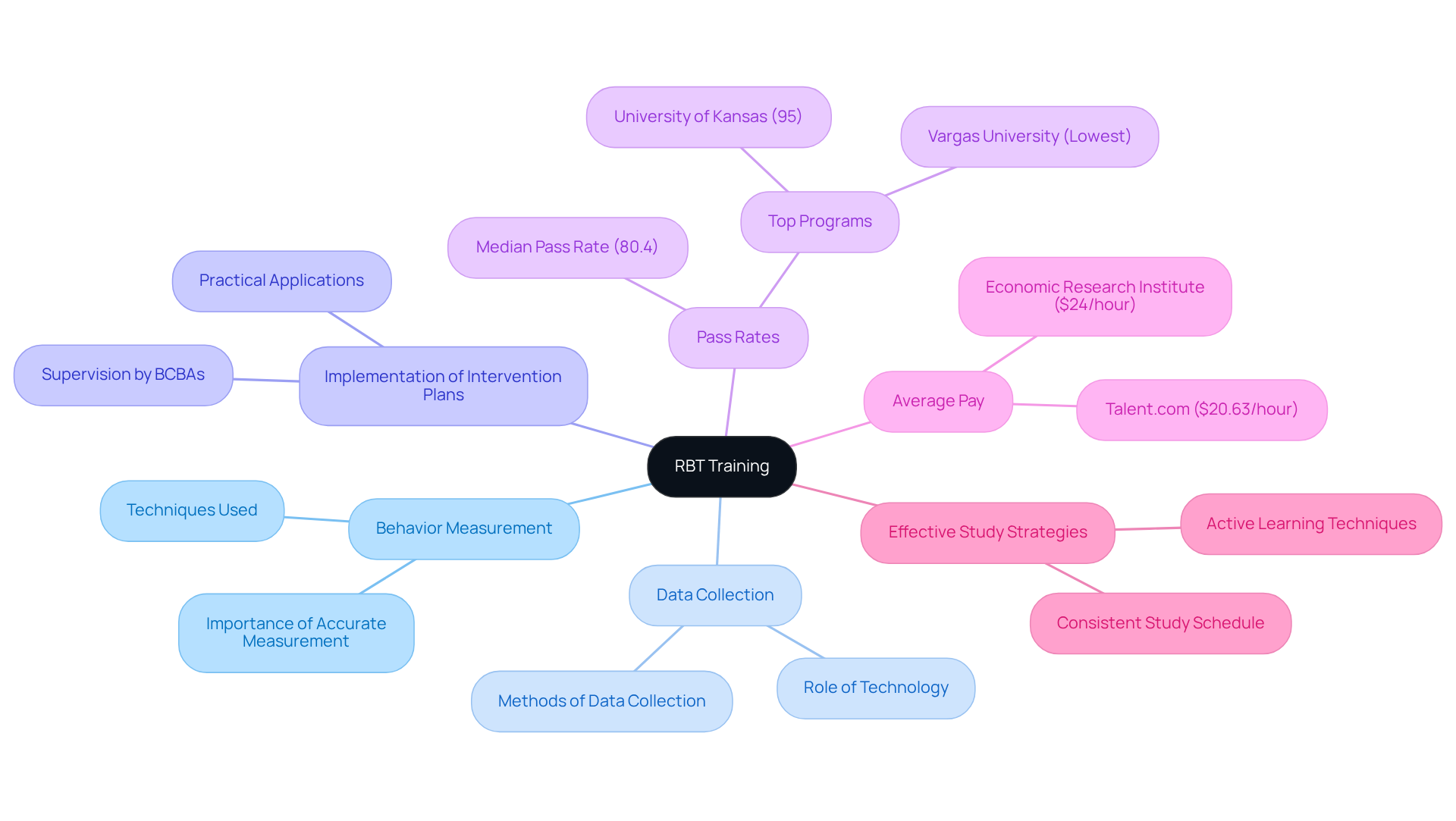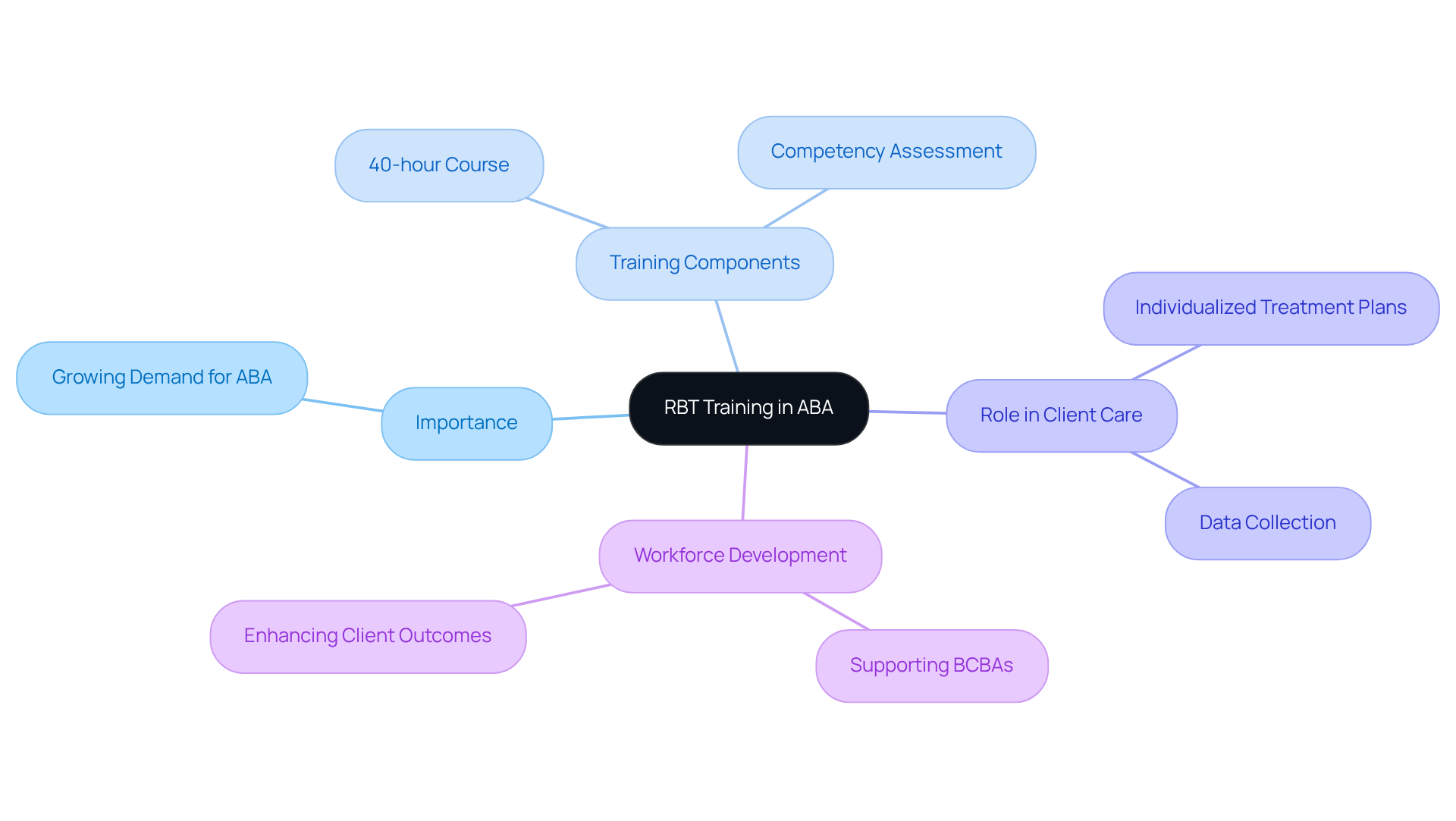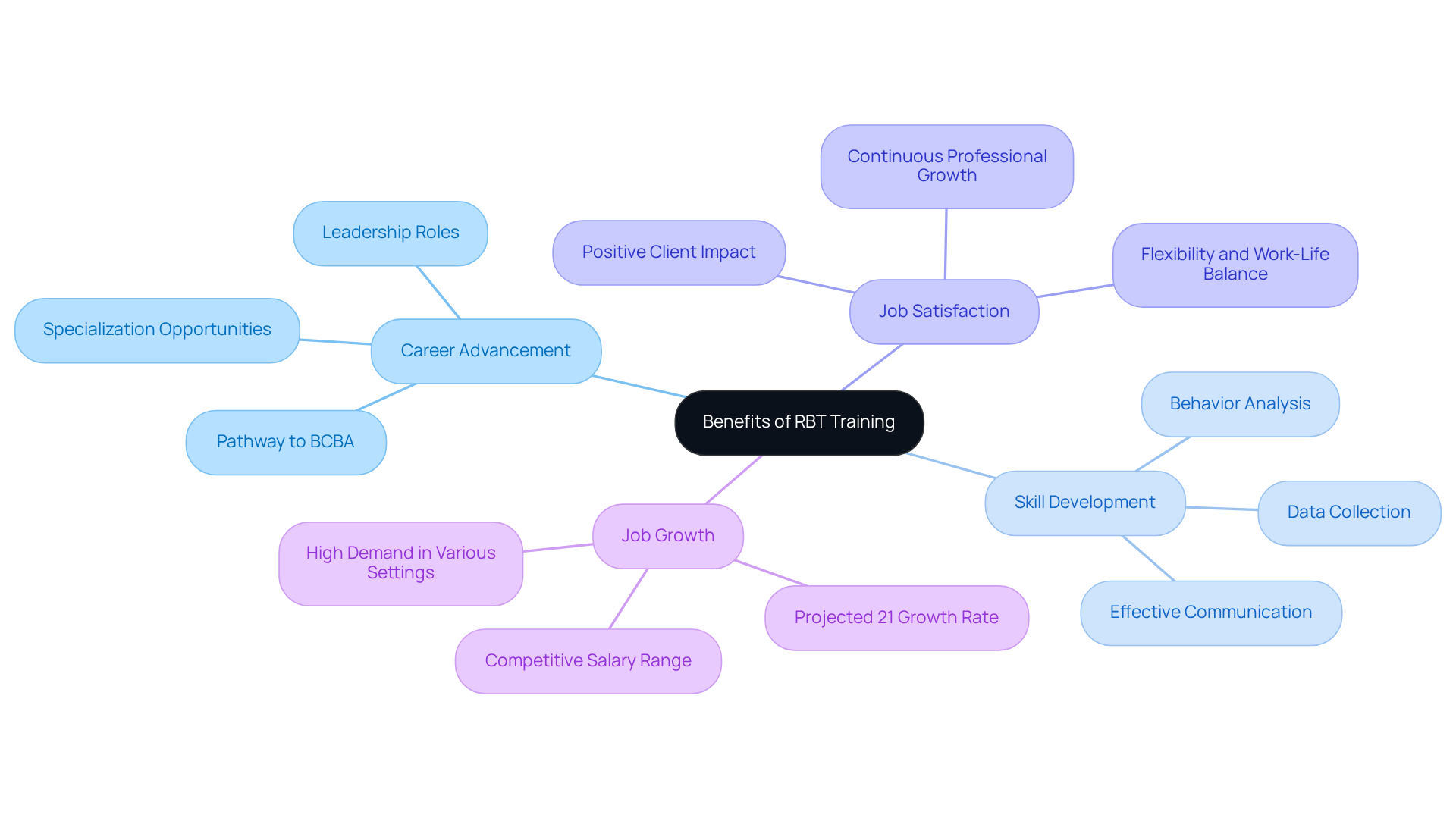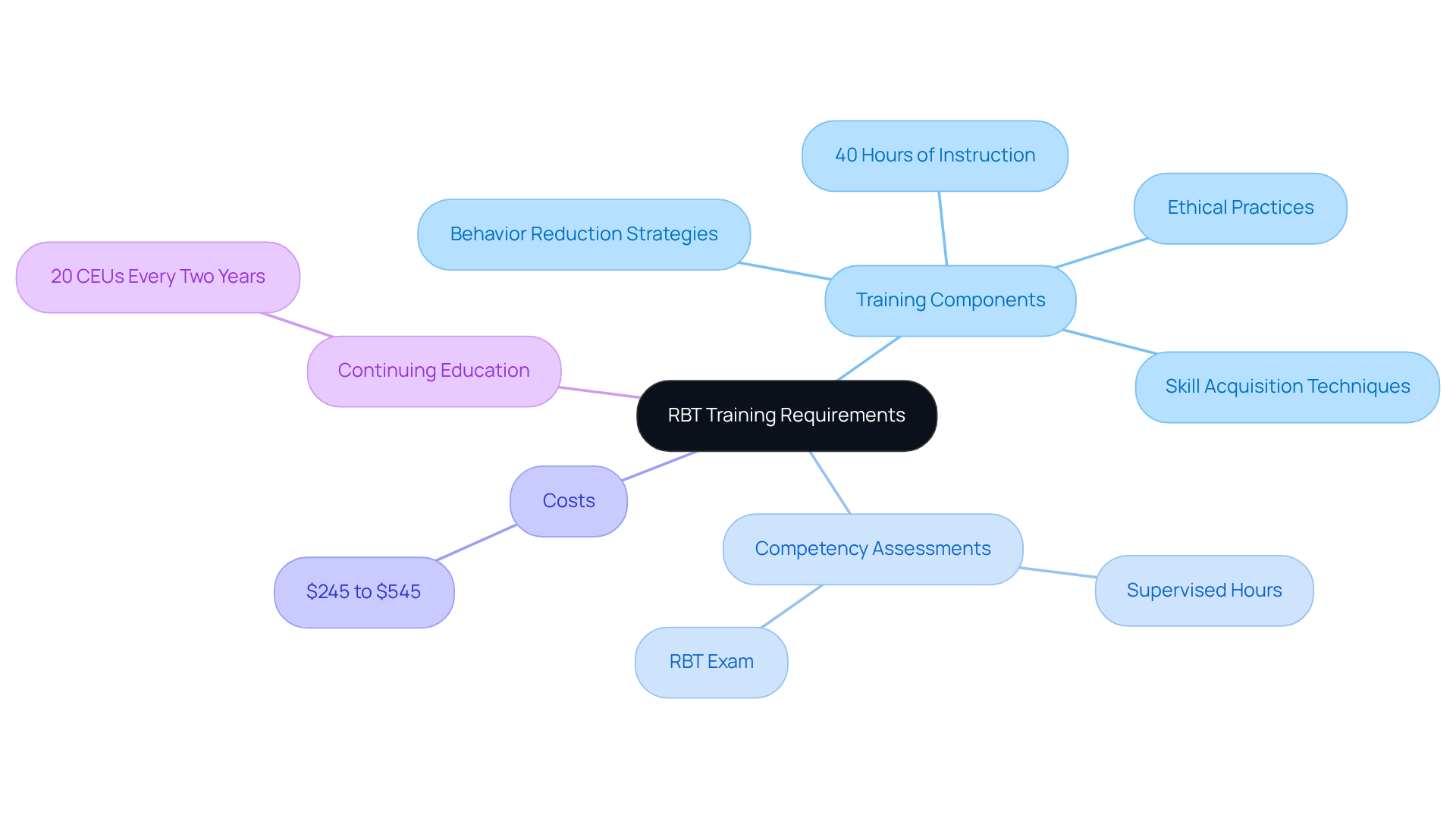September 8, 2025

RBT training is crucial in addressing the increasing demand for Board Certified Behavior Analysts (BCBAs). With the field of Applied Behavior Analysis (ABA) therapy expanding rapidly, the need for skilled professionals has never been greater. This structured educational program is designed specifically to equip individuals with the essential skills necessary to assist BCBAs in delivering effective ABA services.
The comprehensive curriculum of the RBT training program encompasses practical applications and competency assessments. This ensures that Registered Behavior Technicians (RBTs) are not only well-prepared but also capable of effectively supporting clients. By investing in RBT training, you are contributing to the growing demand for qualified professionals in ABA therapy.
Are you facing challenges in hiring qualified RBTs? Consider how the structured approach of RBT training can enhance your recruitment strategy. By utilizing platforms like Hire ABA, you can streamline your hiring process and ensure that your team is equipped with the best talent.
In conclusion, the importance of RBT training cannot be overstated. It plays a vital role in the professional development of individuals in the field of ABA therapy. Take action now to ensure that your organization is supported by competent and skilled Registered Behavior Technicians.
In the rapidly evolving field of Applied Behavior Analysis (ABA), understanding the intricacies of RBT training is essential, especially as the demand for qualified professionals continues to surge. This structured educational program not only equips individuals with the foundational skills necessary to support Board Certified Behavior Analysts (BCBAs) but also enhances the quality of care provided to clients.
However, with the complexities of behavior analysis and the rigorous standards set for certification, what challenges do aspiring Registered Behavior Technicians face in their journey towards becoming effective practitioners? This inquiry invites reflection on the current hiring challenges in the industry and prompts consideration of how to navigate these complexities effectively.
What is RBT training? It refers to a structured educational program crafted to equip individuals with essential skills for assisting Board Certified Behavior Analysts (BCBAs) in delivering behavior analysis services. This program encompasses core concepts of Applied Behavior Analysis (ABA), including:
RBTs are trained to work directly with clients, applying ABA principles under the supervision of a BCBA, which is crucial for effective client support.
The educational framework integrates theoretical knowledge with practical application, ensuring RBTs are well-prepared for their roles. As of 2025, numerous RBT instructional programs are available across the United States, reflecting the growing demand for qualified professionals in the field. Notably, five out of 31 RBT preparation programs achieved first-time examination pass rates of 90% or higher in 2023, with a median pass rate of 80.4%. Understanding what is RBT training is crucial, as it lays the groundwork for the successful implementation of ABA therapy, ultimately enhancing the quality of care provided to clients.
With the reported at around $24 per hour by the Economic Research Institute and $20.63 per hour by talent.com, the competitive job market underscores the importance of thorough preparation programs. These programs not only ready candidates for the certification exam but also equip them with the necessary skills for effective practice in various environments.

Understanding what is RBT training is crucial in the realm of Applied Behavior Analysis (ABA), especially given the surging demand for ABA services. With approximately 1 in 36 children in the U.S. diagnosed with (ASD), the urgency for qualified professionals to implement effective interventions is greater than ever.
Registered Behavior Technicians (RBTs) act as frontline workers in ABA therapy, directly engaging with clients and executing evidence-based strategies to foster positive behavior change. Their comprehensive training, which encompasses a 40-hour course and competency assessment, helps them understand what is RBT training and prepares them to support Board Certified Behavior Analysts (BCBAs) in delivering high-quality care.
This collaboration not only enhances client outcomes but also plays a vital role in the overall development of the ABA workforce. For example, RBTs are instrumental in crafting individualized treatment plans and collecting data to monitor progress, underscoring their indispensable role in elevating client care.
As the ABA market is projected to expand at a compound annual growth rate (CAGR) of 4.56%, knowing what is RBT training is crucial for sustaining this growth.

Understanding what is offers numerous benefits, including career advancement opportunities and skill development. Did you know that the demand for Board Certified Behavior Analysts (BCBAs) is on the rise? For individuals seeking to enter the field of Applied Behavior Analysis (ABA), learning what is RBT training can serve as a stepping stone to more advanced roles, such as BCBA.
What is RBT training? It is a program that equips individuals with practical skills that are highly valued in the job market, including:
Moreover, registered behavior technicians frequently express heightened job satisfaction as they observe the beneficial effects of their efforts on clients' lives, further encouraging them to seek continuous professional growth in the field. The Bureau of Labor Statistics forecasts a 21% job growth rate for registered behavior technicians, emphasizing the rising demand for these professionals.
Furthermore, RBTs typically enjoy flexibility and work-life balance in their roles, which enhances their overall job satisfaction. Specialization in niche areas can also significantly enhance career opportunities, making RBT education a valuable investment in the evolving landscape of ABA therapy.
To grasp what is RBT training, candidates must finish a 40-hour preparation program and pass a competency assessment, ensuring they are well-prepared for their roles.

What is RBT training? It is crucial and requires at least 40 hours of instruction focused on fundamental ABA concepts, followed by a competency evaluation overseen by a qualified BCBA. This comprehensive curriculum addresses essential areas such as ethical practices, behavior reduction strategies, and skill acquisition techniques, which help explain what is RBT training. Candidates participate in interactive learning through quizzes and assignments that reinforce their understanding of the material. Upon completion of the program, candidates must pass the , which assesses what is RBT training, evaluating both their theoretical knowledge and practical application of ABA principles. This rigorous certification process provides an understanding of what is RBT training, equipping registered behavior technicians to deliver effective support in ABA therapy environments while ensuring compliance with industry standards and best practices.
The passing rate for the competency assessment serves as a key indicator of the training's effectiveness, with many candidates showcasing a solid grasp of the necessary skills and knowledge. Additionally, registered behavior technicians are required to complete at least 5 percent of their service hours under direct supervision, a critical component for the practical application of their skills. The total investment for RBT certification typically ranges from $245 to $545, and RBTs must complete 20 Continuing Education Units (CEUs) every two years to maintain their certification. Training options are diverse, including online and in-person formats, catering to the varied needs of candidates and employers.
Are you facing challenges in hiring qualified BCBAs? Consider the benefits of utilizing Hire ABA for your recruitment needs. Our platform not only connects you with skilled professionals but also ensures that you have access to a pool of candidates who meet the rigorous standards required in the field.

RBT training stands as a crucial program designed to equip individuals with the essential skills necessary to support Board Certified Behavior Analysts (BCBAs) in delivering effective behavior analysis services. By seamlessly integrating theoretical knowledge with hands-on practice, RBTs are well-prepared to implement Applied Behavior Analysis (ABA) principles, ultimately enhancing client care and outcomes.
This article underscores several key aspects of RBT training, including its structured approach, the significance of comprehensive education in ABA, and the escalating demand for qualified professionals in this field. With a rigorous curriculum that encompasses a 40-hour course and competency assessments, RBTs are trained to engage directly with clients, collect data, and implement individualized treatment plans. The increasing job opportunities and competitive salaries further highlight the value of this training for career advancement and professional fulfillment.
Given the rising prevalence of autism spectrum disorder and the expanding ABA market, understanding RBT training is more crucial than ever. As the demand for skilled RBTs continues to surge, investing in this training not only prepares individuals for a rewarding career but also contributes to the overall enhancement of behavioral health services. Embracing the opportunities that accompany RBT training can lead to meaningful changes in the lives of clients and the professionals dedicated to serving them.
What is RBT training?
RBT training refers to a structured educational program designed to equip individuals with essential skills for assisting Board Certified Behavior Analysts (BCBAs) in delivering behavior analysis services.
What core concepts are included in RBT training?
RBT training includes core concepts of Applied Behavior Analysis (ABA), such as behavior measurement, data collection, and the execution of behavior intervention plans.
Who do RBTs work with and under what supervision?
RBTs work directly with clients, applying ABA principles under the supervision of a BCBA, which is essential for effective client support.
How does the educational framework of RBT training integrate knowledge and application?
The educational framework integrates theoretical knowledge with practical application, ensuring RBTs are well-prepared for their roles.
What is the current status of RBT instructional programs in the United States?
As of 2025, numerous RBT instructional programs are available across the United States, reflecting the growing demand for qualified professionals in the field.
What were the pass rates for RBT preparation programs in 2023?
In 2023, five out of 31 RBT preparation programs achieved first-time examination pass rates of 90% or higher, with a median pass rate of 80.4%.
Why is understanding RBT training important?
Understanding RBT training is crucial because it lays the groundwork for the successful implementation of ABA therapy, ultimately enhancing the quality of care provided to clients.
What is the average pay for registered behavior technicians?
The average pay for registered behavior technicians is reported to be around $24 per hour by the Economic Research Institute and $20.63 per hour by talent.com.
What is the significance of thorough preparation programs for RBTs?
Thorough preparation programs are significant as they not only prepare candidates for the certification exam but also equip them with the necessary skills for effective practice in various environments.
Our expert recruitment strategies and AI-driven sourcing ensure that you receive top-notch candidates quickly, without compromising on quality. Whether you’re looking for BCBAs, Clinical Directors, or RBTs, we’ve got you covered.